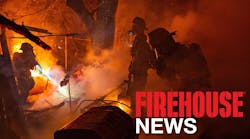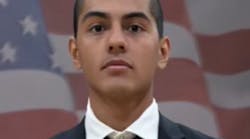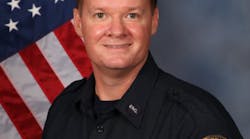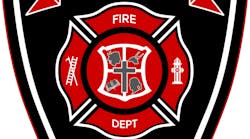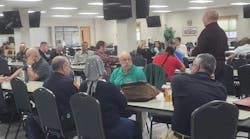Our three kids and I sat with him in our little blue-and-white bedroom for the last time, each with a hand on him so he’d know we were there. I put my hand on top of each of theirs and squeezed and said, “This is Sam, this is Ben, this is Jenn and I’m here.” He struggled as he had done much of the night. Our youngest son, only 13 at the time said gently, “No, Dad. It’s OK. You’ve fought so hard for so long.” And then he took his last breath and was gone.
He spent the last night of his life trying to live and die all at the same time. It is perhaps life’s greatest paradox. Bob Ortega had been a Los Angeles City firefighter for 22 years when he died from duty-related causes. Lou Gehrig’s Disease is cruel, and without a second thought, it took one of God’s bravest and most beloved home that rainy spring day in 2005. We had been married for almost 24 years.
I told the kids that a person doesn’t die a hero unless he lived as a hero. Bob Ortega was a hero.
The aftermath of a death always brings the unknown in its wake. For a firefighter’s family, there are added burdens for the widow that often go unnoticed or are not addressed largely because no one speaks about them or because they fall under the category of the unknown. For me, we learned as we went, of course, but after a while, and after I had spoken to other widows, I began to see some common threads. We needed help in seemingly endless ways.
After the funeral and the first few months of love, calls, cards and meals, our grief increased in intensity, but it became increasingly difficult for others to continue to face our grief with us. We knew we were loved, but we didn’t even know what our needs would be; how could anyone else? Our churches, neighbors, friends and firefighter family wanted to help and offered it without condition or exception, but to be a widow means a woman is now single, which puts her in a very vulnerable position.
She needs help, but who does she call? A married firefighter? Should he call her? How often? What will his wife think? Should she call a single firefighter? That could be awkward. How often should a firefighter go to her house? Should he go alone? Where are the boundaries or plan, and who does the firefighter answer to? Who keeps track of her needs and makes sure that when a promise of help is made it is done? If there is work to be done at her house, who pays for it? If she needs legal or financial advice, who can she trust?
Trust for a widow is paramount, but to be honest, it’s hard to get up and brush your teeth each morning, let alone pick up the phone and ask for help.
In addition, firefighters belong to a very unique sub-culture and close-knit community. When their comrade dies, they need to grieve, but they need to do it in a way that doesn’t compromise all that is masculine about being a firefighter. Firefighter suicides are on the rise and experts say that one of the reasons may be that they are not allowed to express grief. Men in general and firefighters in particular need a plan when entering a chaotic situation. Their job requires it. I remember my husband’s training manual even had a detailed diagram and step-by-step instructions on how to make coffee.
There’s always a plan; but death is a thief and mocks its most courageous victims and leaves even the nation’s most noble profession without a way through the inevitable.
But there is a plan now. “Families of the Fallen” was birthed after the death of my husband and is now being used in fire departments across the country. The protocol not only gives fire departments a long-term strategy to help the families of their fallen, but gives firefighters a pragmatic way to express their grief that won’t compromise the integrity of their department or their own families. Allowing a firefighter to grieve helps them to heal, face future trauma and return to work in a healthier, more resilient manner, which in turn helps to secure their own safety, the safety of their fellow firefighters and the communities they serve.
Ideally, the protocol is meant to be set in place prior to a fatality and resources gathered preemptively, which helps to alleviate the chaos often present after a loved ones death, but it can be put in place after a fatality as well. Within the protocol are guidelines for its implementation, including liaison definitions, time parameters within which to make contact with a widow, communication and follow-up logs, suggested boundaries, resource documentation and contact logs and everything a department needs to begin its use. The protocol is easy to implement and can be adapted for use within any business, organization, church, faith-based, law enforcement or military entity.
Statistics say that 75% of all married women will be widowed at least once. Out of the 13 million people widowed in the U.S., 11 million are women. Those are staggering statistics and difficult to accept; especially considering the nature and risk of firefighting. Having a plan makes sense. I think we need one to live like heroes.
The “Families of the Fallen” protocol is endorsed by experts in the fields of grief, trauma and crisis counseling, post-traumatic stress disorder (PTSD), critical incident response (CIR), critical incident stress management (CISM) and suicide prevention. The protocol is easy to implement and can be found at www.familiesofthefallen.net. If you need any help, would like me to consult with your department, speak at your conference or have any questions, you can contact me through that website as well. God bless you all.
Susan VandePol
Founder
“Families of the Fallen”
Grandville, MI
The writer founded the “Families of the Fallen” protocol for fire departments to use when coming alongside widows of fallen firefighters. She is certified in grief, crisis and trauma counseling, crisis intervention, victim response, master life and grief coaching and mediation. Her book Life After Breath is being published this month.
pull quote:
It’s hard to get up and brush your teeth each morning, let alone pick up the phone and ask for help.
